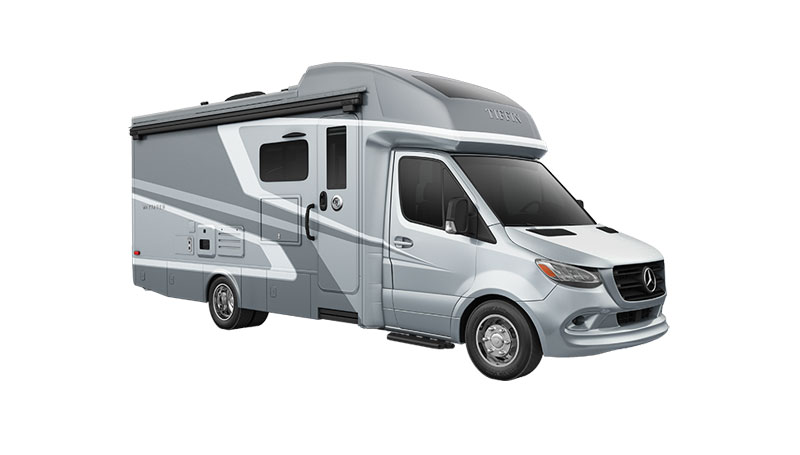Plan Your Site
Before boondocking at a new site, always scout it out or do some research to know what to expect. Take into consideration the terrain, road conditions, location, local regulations, size limitations, and weather. If you're boondocking on BLM or national forest land, know that you can only boondock for 14 days. If you're unsure about something, ask a local ranger, property representative or contact the nearest BLM or forest service office. Keep in mind that all individual stores, gas stations, Hipcamps, Harvest Hosts, and state parks have their own boondocking and overnight camping guidelines. To avoid difficulties and be respectful, follow all of the site's individual rules and regulations.
Respect Other Campers’ Privacy
Whenever possible, park away from other RVs and vehicles that are not in your party and try to be respectful of their space. Follow all posted signs and regulations with regards to the site, including parking 200 feet away from water sources and avoiding any off-roading. Limit generator usage, avoid light and noise pollution, and keep your pets leashed and in your immediate area. Just like you, your fellow RVers are out in nature to enjoy it.
Keep Yourself Safe
Ensure that you have enough food, water, supplies and medications for the duration of your stay, plus a little bit extra. Always have a first-aid kit on hand for both humans and pets. Even if you only plan to boondock for a week, that can easily turn into more if there is an emergency or you’re unable to leave due to weather or road conditions.
Be Flexible and Prepared
If something doesn't feel right or seems unsafe, look for another location. Always be prepared for any situation by packing fire extinguishers, spare parts, tools for repairs, a spare tire, and extra fuel.
Stay Charged
Solar power and generators will be your saving grace while boondocking. If you don't have a solar power system installed on your RV, make sure to bring extra fuel for your generator and a few small, portable solar chargers to keep critical safety items fully charged.
Pack Plenty of Water
A major concern for boondocking is water usage and storage. Always fill your fresh water tank before you leave and supplement with extra jugs or containers. A good rule of thumb is to bring one gallon of fresh water per person, per day. It doesn’t hurt to bring a water filter and purifier to collect rain or local water as well. To save water, consider using waterless soaps and shampoos, baby wipes or dry shampoo. If you do need to shower, try the “navy shower” method: get wet, turn off the water while soaping, and then rinse clean.
Stay Connected
We recommend a cell and Wi-Fi booster for connectivity, but remember that these still don’t guarantee service in all areas. An emergency GPS satellite communicator is helpful in areas where there is no service. Make sure multiple contacts know where you're going and for how long. Letting a few different people know your location is critical in case your primary contact misses a message.
Be Aware of Local Wildlife
Know your surroundings and keep your impact as low as possible. Be aware of bears and other large animals, and have personal protection for you and your pets. Remember all food and trash should stay packed away so as to not attract any unwanted visitors.
Use Local Firewood
Never move firewood from one location to another—this can cause insect infestations and tree illnesses. Only take dead and down wood if you need to gather it. Never chop living trees or plant saplings in the area, and always respect and adhere to local fire bans.
Keep An Eye on the Weather
Extreme weather—particularly high heat, high winds, and intense rain and snowfall—are significant concerns when boondocking. Know what to expect in terms of extreme weather in the region you'll be visiting. If you don't have service, you might not receive a weather alert. Know what your RV’s capability is in such scenarios and plan accordingly. Try to scout sites with shade in summer, spots away from potential rising waters, and always have a safety plan in place for pets.
Have An Emergency Exit Plan
Should an evacuation become necessary or you're unable to get your RV out, have a backup plan. We always have our bikes with us in case we run into a situation where we need to get to town and back. Be aware of several alternate routes, as primary roads can quickly become blocked or impassable in bad weather. Have a meeting point where everyone in your party knows to go to. It’s also a good idea to make sure that multiple people in your party are well-versed in driving the RV. Make a list for how to set-up and hook up your rig, and keep it in a known spot in case another driver needs to reference it.
Leave No Trace
Leaving no trace means packing out everything that you bring in, including all trash, recyclables and human or pet waste. Never dispose of gray or black water on the ground. When possible, leave your camping site cleaner than you found it so that we can all continue to enjoy these amazing places for years to come.







